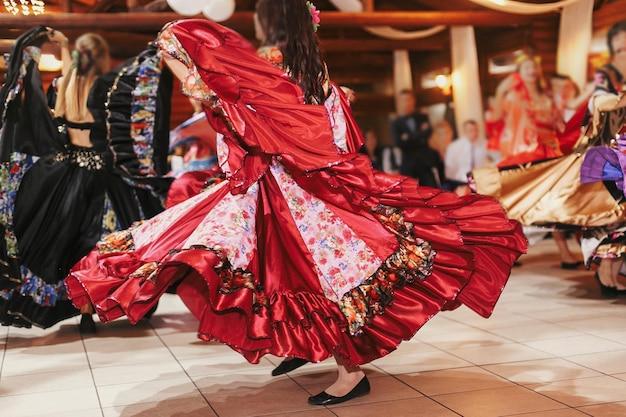Folk songs have been an integral part of human culture for centuries, transcending time and borders. They carry the stories, traditions, and values of a community, passed down from generation to generation. In today’s fast-paced and increasingly digital world, the importance of folk songs in preserving our cultural heritage cannot be overstated.
So, what exactly are folk songs? They are a genre of music that reflects the everyday experiences and emotions of ordinary people. Whether it’s a lullaby sung to soothe a restless child or a protest song rallying against social injustice, folk songs capture the essence of human existence.
In this blog post, we will explore the significance of folk songs in our culture and delve into their characteristics. We will also learn how incorporating folk music into our daily lives can enrich our understanding of our roots and connect us with the collective wisdom of our ancestors. Join me as we delve into the fascinating world of folk songs and discover why they continue to resonate with us in 2023.

Why Folk Songs Matter in American Culture
Preserving Traditions and Stories with Folk Songs
Folk songs have long been an integral part of American culture, embodying the heritage and traditions passed down through generations. These musical gems serve as time capsules that preserve the stories, struggles, and triumphs of our ancestors. Whether it’s the haunting ballads of the Appalachian mountains or the toe-tapping tunes of the Mississippi Delta, each folk song carries a piece of history within its verses.
Connecting Generations Through Music
In a fast-paced digital age, where trends come and go in the blink of an eye, folk songs provide a bridge between generations. They create a sense of continuity and a shared cultural experience throughout time. As grandmothers hum lullabies to their grandchildren and fathers strum folk chords on battered guitars, these songs evoke a feeling of connection to our roots that not much else can replicate.
An Expression of Identity and Diversity
Folk songs celebrate the rich tapestry of American culture, showcasing the diversity and plurality that define us as a nation. From the poignant songs of African slaves to the spirited melodies of Irish immigrants, folk music weaves together the threads of different cultures, telling stories of resilience, hope, and unity. It is a reminder that our strength lies in our differences, and through music, we find common ground.
A Vehicle for Social and Political Commentary
Folk songs have often served as a platform for expressing dissent, addressing social injustice, and advocating for change. Artists like Bob Dylan and Joan Baez lent their voices to the civil rights movement, using the power of folk music to rally supporters and shed light on ongoing struggles. These songs became anthems that inspired activism and challenged the status quo. Folk songs continue to be a catalyst for conversations about equality, justice, and human rights.
Cultivating a Sense of Community
There’s something magical about gathering around a bonfire or sitting in a crowded pub, singing along to familiar folk tunes. These communal experiences foster a sense of belonging, bringing people together in celebration and solidarity. Whether it’s at a folk festival, a neighborhood bar, or a campfire in the woods, these songs invite participation, inviting all to join in and share in the joy of music.
Passing Down Cultural Heritage
Through folk songs, we pass down the stories and traditions of our culture to future generations. They provide a portal into the past, inviting us to explore the lives of those who came before us. By learning and performing these songs, we ensure the preservation of our collective heritage and keep the flame of tradition alive.
From the songs of the labor movement to the tales of the American frontier, folk music has shaped and defined our culture. It is more than just melodies and lyrics; it is a vessel that carries our history, values, and aspirations. So, let us continue to treasure and celebrate the power of folk songs in our society, for they are the heart and soul of who we are as a nation.

FAQ: Why are folk songs important in our culture?
What Are the Different Types of Folk Songs
Folk songs encompass a wide variety of musical styles rooted in the traditional culture of a particular region or community. Some common types include:
Traditional Ballads
These narrative songs recount stories of love, tragedy, and historical events. They often have a repetitive structure and are passed down orally through generations.
Work Songs
Work songs were sung by laborers during various tasks to maintain rhythm, boost morale, and foster a sense of community. Examples include sea shanties, chain gang songs, and agricultural work songs.
Protest Songs
As an expression of dissent or social commentary, protest songs have played a significant role in various cultural movements throughout history. They encapsulate collective aspirations for change and justice.
What Is the Purpose of Folk Songs
Folk songs serve several vital purposes in our culture:
Preserving Cultural Heritage
These songs carry the essence of a community’s cultural identity, transmitting traditions, values, and stories from one generation to the next. They preserve the collective memory and celebrate shared experiences.
Expressing Emotions
Folk songs provide an avenue for individuals to express their emotions, whether it’s joy, sorrow, love, or longing. They reflect the universal human experiences that connect us all.
Building Community
Through participatory singing and dancing, folk songs foster a sense of community and togetherness. They bring people together, encourage social interaction, and create a shared experience that transcends individual differences.
Why Are Folk Songs Important in Our Culture
Folk songs hold immense importance in our culture for various reasons:
Cultural Identity and Roots
Folk songs connect us to our cultural heritage, reminding us of our roots and showcasing the diversity of our society. They are a source of pride and a means to celebrate our unique traditions.
Historical Documentation
By recounting historical events, folk songs provide valuable insights into the past. They serve as historical documents, shedding light on significant social, political, and cultural developments.
Voice of the People
Folk songs often serve as the voice of the marginalized and disenfranchised. They voice the concerns, hopes, and aspirations of ordinary people, shedding light on the realities of their lives.
Creative Expression
Folk songs allow for creative expression, serving as a platform for musicians to experiment with melodies, lyrics, and arrangements. They give birth to new interpretations, evolving with each generation.
Timeless Appeal
Despite the passage of time, folk songs continue to resonate with audiences of all ages. Their simple yet profound melodies and relatable themes make them timeless, ensuring their survival for generations to come.
What Are the Characteristics of Folk Culture
Folk culture encompasses a range of characteristics that distinguish it from mainstream or commercial forms of music:
Oral Tradition
Folk songs are predominantly passed down through oral tradition, hence evolving naturally with each rendition. They are shared and learned within the community, often without the need for written notation.
Simple Melodies and Lyrics
Folk songs typically feature straightforward melodies and lyrics that are easily comprehensible and memorable. This simplicity allows for widespread participation and sing-alongs.
Regional Diversity
Since folk songs are deeply tied to specific regions and communities, they showcase the rich cultural diversity that exists within society. Different regions often have distinct styles, themes, and musical instruments associated with their folk songs.
Collective Ownership
Folk songs belong to the collective ownership of a community rather than being attributed to a single composer. They are continually adapted and modified, reflecting the values and experiences of the entire community.
Intimate Connection with Nature and Everyday Life
Many folk songs revolve around themes of nature, work, love, and common life experiences. They serve as an artistic expression of the human connection with the natural world and the joys and struggles of everyday life.
How Can You Incorporate Music into Your Everyday Life
Integrating music into your everyday life can be a delightful and fulfilling experience. Here are some ideas:
Start Your Day with Music
Begin your day by playing your favorite songs or creating a morning playlist that energizes and uplifts you. Be it folk songs or any other genre, music has the power to set a positive tone for your day.
Make Music a Soundtrack for Activities
Whether you’re cooking, exercising, or doing household chores, playing music in the background can transform mundane tasks into enjoyable experiences. Sing along or dance to the rhythm, infusing joy into your routine.
Explore New Genres
Expand your musical horizons by exploring different genres, including folk songs. Discovering new music opens up opportunities for personal growth, enriches your perspective, and introduces you to diverse cultures.
Music as a Stress Reliever
When feeling stressed or overwhelmed, listening to calming melodies or playing an instrument can serve as an effective stress reliever. Allow yourself moments of tranquility to recharge and find solace in music.
Why Do We Have Folk Songs? Explained with Examples
Folk songs have been an integral part of human culture for centuries. They have emerged and continued to flourish due to various factors. Let’s explore a few key reasons through examples:
Oral Tradition and Cultural Transmission
Before the advent of writing and mass communication, folk songs played a pivotal role in passing down cultural traditions, beliefs, and historical events. For instance, the American folk song “Oh, Susanna” originated as a mining camp song, encapsulating the experiences of the California Gold Rush in the mid-1800s.
Social Bonding and Community Cohesion
Folk songs bring people together, fostering a sense of unity and shared identity. For instance, the African American spiritual “We Shall Overcome” became a powerful anthem during the civil rights movement, symbolizing the collective struggle for equality.
Recording Everyday Life
Folk songs often capture the essence of everyday life and the experiences of ordinary people. The English folk song “Greensleeves” tells a story of love and heartbreak, mirroring the universal emotions and dilemmas faced by individuals throughout history.
Cultural Resistance and Social Commentary
Folk songs have been a medium for social commentary and resistance against oppression. For example, the Irish folk song “The Fields of Athenry” reflects the plight of Irish people during the Great Famine, highlighting their resilience and struggle for freedom.
In conclusion, folk songs are an essential part of our cultural fabric, preserving traditions, expressing emotions, and fostering a sense of community. Their timeless appeal, historical significance, and connection to everyday life make them invaluable treasures passed down through generations. So, let’s embrace the power of folk songs and celebrate the rich musical tapestry they offer.
